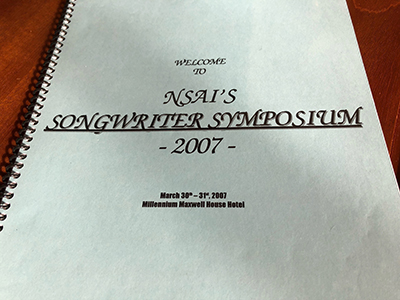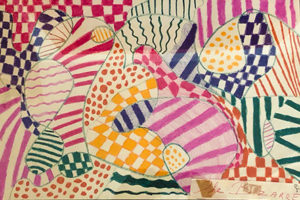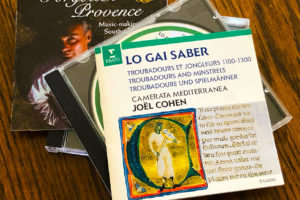I drove to Nashville on Thursday, March 29, 2007 for the NSAI Songwriter Symposium. The night before I left, I read my pastor’s sermon from the previous Sunday about providence. It convinced me to be on the lookout for providence during my trip—and assume that everything that happened and everyone I met was providential. That idea changed how I perceived the people and events around me.
“What would happen to us if we cultivated the discipline of openness? . . . When we believe in the providence of God, we look at trees in a different way, we pay attention to conversations . . . and all with the assumption that this is all part of the providential footprints of our intrusive God.”
— Cary Speaker (“Providence” a sermon given at Mountain Brook Presbyterian Church, March 25, 2007)
When I asked Cary about using his quote from the sermon he said, “That sounds so good I probably borrowed it from someone else.” I do not want to imply that I believe everything happens for a reason or that God ordains everything that happens in our lives or the world. This songwriting journey had led me to be more open to possibilities—to engage with people and events around me. Throughout my life being an introvert made it difficult to interact and join in conversations and to soak up experiences. Learning that I enjoyed being around other songwriters and hearing about their lives was giving me a connection to life that I did not previously have. The definition of providence used in this sermon fit in with this scenario. I thought, why not give it a try?
In Nashville
When I got to the Millennium Maxwell House Hotel in Nashville on Thursday afternoon, it was too early to check in. The woman behind the desk told me to come back in fifteen or twenty minutes. I was hungry so I decided to get some lunch at their restaurant. It was almost 2:00 and I got in just before they closed. Besides me, there were only two other patrons—both men and both sitting alone next to the windows which were about twenty feet away from where I was seated.
I pulled out a book to read while I waited on my food—The Triggering Town: Lectures and Essays on Poetry and Writing by Richard Hugo. I started at the beginning and underlined sentences that stood out to me. After a little bit, the two men struck up a conversation. The first man turned around and asked the other man if he was there for the NSAI Symposium. He answered no. They discussed why they were in town. It came up that they are both Christians. Each told the year they became a Christian and the songwriter gave a brief bio of how he became a Christian. When the other man got up to leave, they both commented on how unusual it is to encounter a Christian and the songwriter said it was providence. I did not say anything to them.
Thursday Night at The Bluebird
The Symposium is on the heels of Tin Pan South—a week of concerts at various venues all over Nashville. The selected performers are in the top echelon of songwriters. Thursday night I went to the Bluebird Café for their 6:00 performance. I had called several days before to get reservations, but there were none left. I could go and perhaps get in on a first-come, first-served basis. When I got there, I did not know how their system worked so I got in the first line I saw. I eventually found out I was in the line for people with reservations. I hurried on over to the other side of the entrance into the line of people hoping to get in if there was space.
It was almost an hour before the show and there were already about ten people in the line for those without reservations. As I stood there, groups of people arrived. As they began to seat people, only a few were let in at a time. Of course, those with reservations were first. Finally, they got to my line and by that time, there was standing room only inside. Some people left because they did not want to stand for that long. And, it took the host so long to decide how many to let in that some people ahead of me left. Several of us stuck it out.
Finally, a guy came out and said there was room for four more people. (I would be the fourth.) Suddenly one more person walked up who had a “pass” (instant reservation). I stood there and took out my fifteen dollars anyway. After those people went in, I remained in place. The guy came back out and I immediately said, “Please let me in, here’s my money.” He paused and said I would have to stand in the doorway. I said, “That’s fine!” and went in. The concert had already begun. I was hot, hungry, and tired, but I did not care.
I could barely see over the guy in front of me. Then a waitress came up and said there was one seat over near the bar. The guy in front of me went over and took the seat. I was able to move up a few feet and it enabled me to lean on the receptionist’s stand. It is a small venue and I was not that far from the performers. In front of me was a path for the waitress and then one row of small tables meshed in with the performers.
The performers—”the aristocracy of songwriters”—were Tony Arata (“The Dance”), Pat Alger (“The Thunder Rolls” and “Unanswered Prayers”), Roger Cook (“I’d Like to Teach the World to Sing” and “Long Cool Woman in a Black Dress,”), and Ralph Murphy (“I’m Still Here, You’re Still Gone”).
Roger Cook had on shorts and played the ukulele. He was filling in for someone who could not make it. He has written many hit songs since the 1960s and sang a medley of some of his early hits from the 60s and I recognized them all.
Tony Arata told the story of singing “The Dance” at the Bluebird when Garth Brooks attended. Garth said if he ever made an album he would record that song. Tony’s tidbit of songwriting advice was to write the songs and good songs will rise to the top.
Each songwriter was wonderful. Their songs are all well-written classic hits. They talked about their songs and how they wrote them. They performed with care and emotion. That entire evening was eye-opening. What had I been missing all these years?
NSAI Songwriter Symposium – Friday Morning
Session with Bill Anderson.
His first hit was “City Lights” in 1957. In 2001 he wrote “A Lot of Things Different” with writer Dean Dillon. Kenny Chesney recorded it in 2002. In talking about the song, Anderson said at that point in his life, looking back, he realized that he could have done a lot of things different. He finished his session by singing this song.
As he sang there was not a dry eye. I was weeping. Everyone was crying—all three hundred people. That is the power of a song—just a singer and a guitar.
Publisher Q & A Session
Everyone in attendance at the NSAI Songwriter Symposium had chosen a particular publisher to play a song for. There were about ten or twelve songwriters in the session I attended. The A & R Publisher Rep went around the room and played the opening from everyone’s song. I think she was spot-on with her comments about each song. She was listening from the point of view of whether the song was ready to promote and be a commercial hit. Here’s what she said about my song, “Life is Good”: “musically beautiful, the lyrics are simple.” I think “the lyrics are simple” was meant to be a criticism and that it wasn’t what she would look for. I meant for them to be simple, so I suppose I accomplished my goal—that is a good thing—for better or worse. Perhaps my goal should be different? I don’t know, I was still trying to learn how to write lyrics.
NSAI Songwriter Symposium – Friday Afternoon
Songwriting Panel
Teddy Gentry (from the group Alabama), Gary Nicholson, and Stephony Smith (“It’s Your Love” and “Back When”). Stephony had started out as a jingle writer in Memphis. She went on to write many hit songs. She told how she wrote “It’s Your Love” which Tim McGraw and Faith Hill recorded.
NSAI Songwriter Symposium – Friday Night
Friday Night Concert at The Rutledge
If you didn’t attend Tin Pan South, in order to get into venues you have to go early and wait in line. Friday night I got there real early and sat at a table inside. While I sat there, I took out my notepad and started writing whatever came to mind . . . similar to writing exercises we learned at song camp. You write from a stream of consciousness and do not edit until later. I had no idea what I would say from phrase to phrase or from word to word, but these thoughts were obviously floating around in my mind. My writing ended when someone came up and told me it is time to go outside and wait in line.

The Concert
The performers at The Rutledge that night were Craig Carothers, Angela Kaset, Don Henry, and Michelle Malone. I chose that venue because Don and Angela would be there. They were teachers/songwriters who I met at NSAI Song Camp in February. Michelle is a fabulous rock/blues guitarist and singer-songwriter. Her performance was very passionate and raw . . . mesmerizing!
After the concert, I spoke to Don. He asked me how it was going. I told him I was still working hard on songwriting. I love being around songwriters in Nashville. They enjoy and drink in all of life! That gives me energy and inspiration to keep working on writing good songs.
Starting Over (taken from my notes written on Friday, March 30, 2007)
Doing it all again
But not really again
It’s for the first time
It is to my back, like the wind
Pushing me forward
Pressing me to fly
To go beyond my imagination
Making me imagine that I can fly
I can glide across the sky
Play with the clouds
Sing like the birds
Whisper like the wind
Music will be my food
Words will be my power
This much I have always known, music is the only art that’s worth a damn. I envy you guys.
— Kurt Vonnegut, Jr. wrote this in a note to the rock band Ambrosia in January 1976. Ambrosia’s hit song “Nice, Nice, Very Nice” had lyrics adapted from Vonnegut’s 1963 novel Cat’s Cradle. Vonnegut shared a writing credit for the song.
NSAI Songwriter Symposium – Saturday Morning
David Pack (from the group Ambrosia) was one of the presenters. His session was very inspiring. He has a sensational voice and his falsetto is high and pure—even on Saturday morning!
My favorite story from this trip to Nashville is from David Pack. He is friends with Michael McDonald (of the Doobie Brothers.) David had asked Michael’s help with some lyrics he was having problems with. Michael said he would try but said, “Your dumbest, stupidest lyrics will probably be your best song.” David did not hear back from him for a while. Finally, one night Michael calls up and says, I think I have some different lyrics for your song. David Pack replied that they had already recorded the song and it was now in the top 40. That song? “The Biggest Part of Me.”
Providence?
On the first day of the NSAI Songwriter Symposium, in the Publisher Q & A Session, I met a talented playwright and singer-songwriter named Garr Lange. After class, he walked over and asked me my name. I told him, but we did not continue the conversation. I suppose I was tired. Later, I was disappointed that I had not followed through with more conversation. I had missed my “providence” opportunity.
The next day when we were back in the large auditorium with everyone (about 300 people), guess who was sitting right in front of me? Garr! So, thinking about providence, I tapped him on the shoulder and we struck up a conversation. In that session Hugh Prestwood talked about songwriting and lyrics. After class, Garr asked me what I had learned. Before we left, he gave me his CD, Crossing the Line. He said he would give it to me if I would listen and let him know my favorite song on the CD. I promised I would.
Back Home
After I had been home a few days, I emailed Garr to check in. That began our conversations. He offered to critique some of my lyrics. He has the spirit of a teacher and is kind and generous. Anyway . . . providence. He said many things I needed to know about lyrics, and about writing in general.
Tell us the truth, your truth, the one that springs from your soul.
— Garr Lange (b. 1956) playwright, singer-songwriter, country-rock musician
In an email, I complained to Garr about not having many life experiences to write about. Here is what he wrote:
Life experiences really don’t mean a hill of beans in my book. The power of imagination is unlimited in all of us. All you have to do is learn how to tap into the unconscious self. That’s the ‘art’ in writing. You can be anything you want to be, do anything you want to do. Listening to a song can move you, reading a book can move you, reading a poem can move you, watching a movie can move you, reading the Bible can move you etc. etc. All endeavors demand imagination on your part. Emily Dickinson never got out of her bedroom. She did pretty well. The creative process is that sweet exercise in creating something from nothing. Tell us the truth, your truth, the one that springs from your soul. It’s the thing I like to call your, ‘secret garden’. In there you’ll find the wonderful mystery of what we call art. I do believe you’ve already begun the journey. By realizing that songwriting is something you need to do in order to fulfill your life, you’ve peeled back one layer.
Garr’s music may be found here:
Amazon:
Crossing the Line
Run Through Fire
Reflection
I am about to do a new thing; now it springs forth, do you not perceive it?
I will make a way in the wilderness and rivers in the desert.
Isaiah 43:19 (New Revised Standard Version)
“Behold, I am doing a new thing. I believe this is a statement describing the providence of God. Behold, I am doing a new thing. Can you see it?”
— Cary Speaker (“Providence” a sermon given at Mountain Brook Presbyterian Church, March 25, 2007)
All I have to do is look in the mirror, listen to my voice, read my lyrics, read my journal, listen to the songs I have recorded and, look in my heart. My songwriting journey has led me to many new things, new people, and new experiences. And by consciously setting out to pay attention to providence on this trip the NSAI Songwriter Symposium, it changed how I responded to every person I met and every circumstance I encountered. It has made my life richer, fuller, and more alive.
§
Have you ever made it a point to speak to someone at an event and that person changed your life?










Leave a Reply
Your email is safe with us.